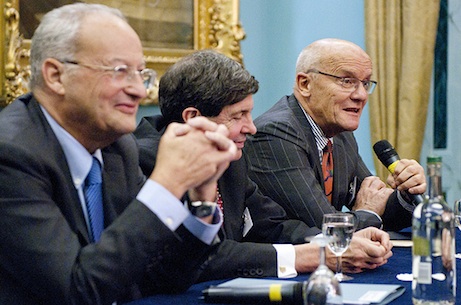
A joint event was hosted by the Bill and Melinda Gates Foundation and Gates Cambridge at the Institute of Directors last night.
The Bill and Melinda Gates Foundation and Gates Cambridge hosted a joint event in London last night to celebrate the role of philanthropy in meeting the challenges of the 21st century.
The event at the Institute of Directors was attended by 70 Gates Cambridge Scholars and Alumni from more than 25 countries as well as guests from the media, politics, not for profit and academic sectors.
Lord Sainsbury, Chancellor of the University of Cambridge, welcomed the guests and said that the relationship between Gates Cambridge Scholars and the University of Cambridge was a “win win situation” and had been “a huge success”.
“The Scholars are a great source of pride to the University and to the Bill and Melinda Gates Foundation,” he said after listing some of the achievements of Scholars and Alumni in recent months.
He praised the generosity and imagination of the foundation for their $210m gift to the University to set up Gates Cambridge in perpetuity. “It was a very imaginative idea which will have a hugely beneficial effect.”
The world needed innovation and imagination and governments were often terrified at funding innovation, he added, because it carried the risk of failure. “That’s what makes transformative gifts such as that from the Bill and Melinda Gates Foundation have such a disproportionate effect
Future leaders
Professor Robert Lethbridge, Provost of the Gates Cambridge Trust, called the Scholarships “one of the jewels in Cambridge’s crown” and said they created a global network of future leaders ready to face the challenges of the modern world. They shared the values and vision of the foundation and Gates Cambridge represented “an investment in brain power” and ideas that could make a big difference in the long term.
The Scholarships’ strengths included the fact that they funded vital postgraduate work, that they cover both fees and maintenance, are means blind and embrace a multi-dimensional view of how the lives of others can be improved which is not just limited to science and technology. Progress in medicine and science was inseparable, he said, from the cultural, social, political and legislative framework.
“I emerge from interviews for Gates Cambridge Scholars awestruck by the exceptionality of those who succeed,” said Professor Lethbridge, “by what they have done so far and their ideas, energy and optimism. Gates Cambridge Scholars will change the parameters of our knowledge and shape the future.”
Geoffrey Lamb, President, Global Policy & Advocacy at the Bill and Melinda Gates Foundation, spoke of the foundation’s focus on complex human and technical problems and its four key values – innovation, rigour, collaboration, and optimism.
One of the foundation’s main priorities for the future is working with partners to eradicate polio from the last three remaining countries where it still has a grip – Pakistan, Afghanistan and Nigeria.
A Q & A with the audience followed. Professor Lethbridge concluded by saying that Gates Cambridge Scholars had enriched Cambridge with their optimism and new ideas. He did not know of a department in Cambridge which did not want a Gates Cambridge Scholar.
He added that the Bill and Melinda Gates Foundation and the Gates Cambridge would in the future be “indelibly associated as extremely powerful in all walks of life across the globe and would enhance the University of Cambridge’s reputation”.












